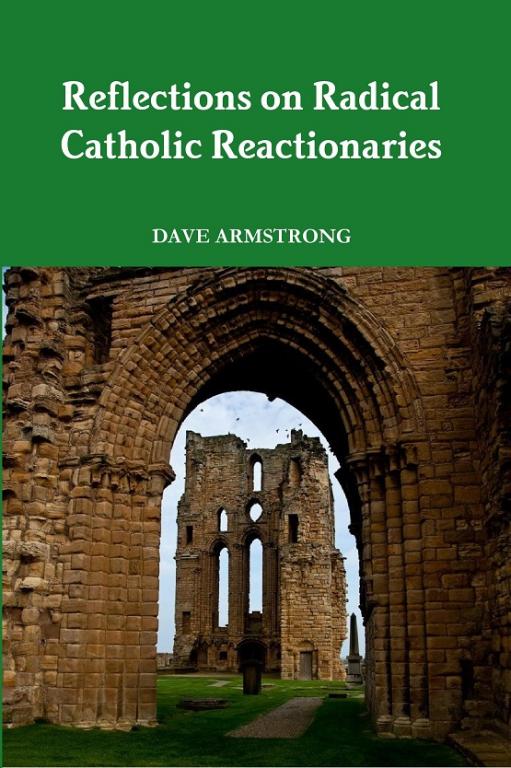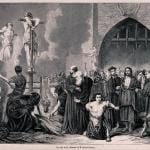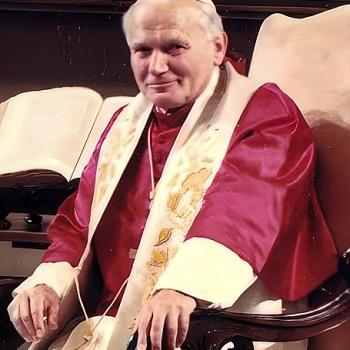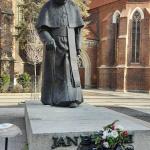
[see book and purchase information]
***
This back-and-forth occurred on my [always public] Facebook page on 3-4 December 2020. Karl Keating was initially responding to my article, Kwasniewski vs. Cdl. Newman Re Pope- & Council-Bashing (12-3-20). His words will be in blue.
***
I only glanced at Dave’s article–which, I see, is a response to something written as long ago as March 2019! I don’t intend to read the article thoroughly: not enough interest in the topic . . . But, if I were to read Dave’s article, however much I might end up agreeing with his argument, I would remain put off by his name calling: “radical Catholic reactionary.”
*
I have read his justification for using this and other loaded terms, but I still find the justification weak and counterproductive. I wish he’d just stop it. If he wants to call Peter Kwasniewski a “Traditionalist,” that’s okay, since that term doesn’t carry a heavy sense of opprobrium the way “radical Catholic reactionary” does. The latter phrase immediately tells the reader that Dave isn’t interested in playing fair . . . I long had been unhappy with the way Dave name-called those he opposed–I think even intellectual opponents deserve to be treated respectfully.
*
I don’t see how an article being 20 months old is relevant to anything, but since you brought it up, my friend Timothy Flanders brought up a citation from Newman that I was unfamiliar with; then later noted that Dr. Kwasniewski cited it in this article. So I replied. I’m weird that way. People ask me questions, and I tend to address them: all the more when it has to do with Cardinal Newman: who has been my hero for thirty years.
*
You comment without even reading the article. As to my coined term, you and I discussed that back in 2012 or 2013 when I coined it [see an example of what was being discussed]. You didn’t find it offensive then; you simply thought a better title could be had. But that’s a long time ago now, when we could simply talk as fellow apologists: back in the days when I defended you and Catholic Answers when I met Michael Voris in person, after he had been blasting you and others for making too much money (so he thought).
*
The term was specifically coined because traditionalists themselves were fed up with being called rad trads (then — if not still — in frequent use at Catholic Answers), and I wanted to find a term which would distinguish legitimate traditionalists from the more extreme faction. In other words, it was out of courtesy to fellow orthodox Catholics.
*
I will continue to treat you with respect as the “father of modern Catholic apologetics”, and recommend your books. But I’m most unimpressed with the ethics of your behavior and moving to the far ecclesiological right over the past few years. Meanwhile, you seem to care less about Dr. Kwasniewski’s grave errors, than you do with my term that classifies what they are.
*
I just added two paragraphs of his to the end, after they were pointed out to me today by Dr. Robert Fastiggi:
*
To Fr. Longenecker’s question, then — “What shall we do about Vatican II?” — I suggest we leave it alone, leave it behind, leave it in peace, along with Lyons I, Lateran V, and other councils you’ve never heard of, and turn our minds and hands to better things ahead: . . .
*
If I might change the conversation, I would say a more pressing question is: “What shall we do about Vatican I?” This past Sunday, December 8, marked the 150th anniversary of the opening of a council that would forever change the way Catholics perceived and interacted with the papacy — the impetus for a runaway hyperpapalism capable of leveling centuries of tradition. In many ways, we are more threatened today by the spirit of Vatican I, which it will take a mighty exorcism to drive away.
*
I guess blasting me publicly and worrying about my terminology is far more important than this outrageous statement from a Catholic, huh Karl?
*
I have been disappointed with the way you treat writers with whom you disagree, whether in few or many things. You have trouble dealing sympathetically with people who don’t follow your party line. Some of them might be completely wrong about something, but even they don’t deserve to be slapped with labels intended to bias readers or to have their arguments poorly represented. I could say more, but there’s no point. I’m not here to argue your characterizations of me or of anyone else.
*
Labels such as “radical Catholic reactionary” [either that or another one for the same purpose] are 1) necessary for classification and analytical purposes, and 2) simply part and parcel of religious sociology (and the latter was my major in college).
*
You may not like my choice of words, but whether you do or not, and whether you are arguably objectively right about it or not, some sort of words will continue to be used to describe the same group, and nothing would be gained, nor the apologetically crucial and necessary discussion moved forward, even if I denounced and stopped using my own carefully considered choice. I was trying to apply religious sociology, and offered extensive rationales for my usage: that no one (including yourself) has truly seriously interacted with at all, let alone refuted.
*
Before I coined it, probably the most commonly used term was rad trad. In fact, it was a controversy at Catholic Answers that most immediately motivated me to come up with a better term. You don’t like my term; I don’t like rad trad . . . Who’s to say who is right? It has to be discussed. But few — including you — are willing to seriously engage that topic. I am. The problem won’t go away on its own.
*
Other titles previously used were Lefebvrites, ultra-traditionalists, extreme traditionalists [used by both Pope Benedict XVI and Pope Francis],
or (one I favored) quasi-schismatics, while we in turn are called by them “neo-Catholics” or “Novus Ordo Catholics” or “Vatican II Catholics” or simply, modernists / liberals (and lately, the delightful “Bergoglians”).
*
The problems of classification and theology won’t go away. You offer no help in the matter (although quite capable of it); you simply trash my use and pretend that it is solely motivated by childish ad hominem tactics. This won’t do, and you’re not gonna get away with your evasive belittling of my serious attempts to grapple with it, as an apologist and amateur sociologist, on my own page.
*
***
*
Related Reading
*
***
*
Summary: I coined the term, “radical Catholic reactionary” in 2013 precisely in order to differentiate far more extreme self-described “traditionalists” from legitimate, mainstream Catholic traditionalists.
*
***

















